Set This House in Order: A Romance of Souls

Andy Gage, original owner of the body, is dead. The main character of this novel is Andrew, one of the souls that now inhabits the body and has control of it most of the time. His father is Aaron, another soul and the leader of the house in the body's head wherein countless other souls reside.
If this sounds confusing, then one of the best things I can say about this novel is that, by the time you get a few chapters in, Andrew's house, soul-hierarchy, and multiple personality disorder are entirely unremarkable facts.
Through the book, Andrew finds himself helping a woman named Mouse or Penny (or a few others), while two houses become less stable, one gets knocked down, and someone doesn't go to prison for murder.
'“Come on,” he says, taking her hand. “It’ll be fine.”
Mouse shakes her head: Oh no it won’t. Andrew, smiling—how does he stay so calm?—leans in close enough to whisper.
“Don’t be afraid,” he tells her. “We have him outnumbered.”'
-Andrew and Mouse
Fool

I read both this and Bill's actual King Lear in conjunction, a method that I would highly recommend, never-mind that I can no longer mentally separate the two from each other.
Fool follows the same events as King Lear (or just about) and gives a very strong argument for the real main character in the play being the fool, Pocket. In this adaptation, Pocket is the source behind every conflict, wittingly or no.
It's very crude (see Warning*) and that's all I can really say, but be prepared for sharp-witted repartée, gruesomely graphic narration, and "heinous fuckery most foul".
Anyway, if anyone ever asks me my opinion on King Lear and I happen to mention terrible codpieces or Princess Goneril's fondness for spanking, all blame lies solely on this novel.
*Warning: 'This is a bawdy tale. Herein you will find gratuitous shagging, murder, spanking, maiming, treason, and heretofore unexplored heights of vulgarity and profanity, as well as non-traditional grammar, split infinitives, and the odd wank. If that sort of thing bothers you, then gentle reader pass by, for we endeavor only to entertain, not to offend. That said, if that’s the sort of thing you think you might enjoy, then you have happened upon the perfect story!'
-Christopher Moore
Old Man's War

I've never been fond of space operas, but I really liked the ideas behind this novel. The elderly fight the good space fight in exchange for being made young again and, if they survive their years on active duty, a second lease on life on one of the colonised planets.
The trouble lay with the characters, who, while varied in their backgrounds, all had the exact same voice. It's a case of "too much snark" and "is that really something a septuagenarian would say?" I was easily distracted from this grievance by the alien battles (which were great), but there's only so much dry sarcasm that a person can take.
'I did two things on my seventy-fifth birthday. I visited my wife's grave. Then I joined the army.'
-John Perry
The Bone Key
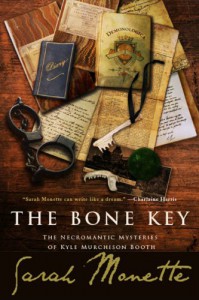
If a cringe could be personified, it would come in the form of Kyle Murchison Booth. He's tall, awkward, pale, and stammering. He's also the absolute last person anyone would expect to become a paranormal investigator, and yet....
When his old school-mate and object of worship, Augustus Blaine, walks back into his life, Booth suddenly and uneasily discovers, just under the thin surface veneer of reality, the existence of a shadow world. And the creatures that dwell there discover the existence of Booth.
It's an homage to Lovecraft, with ghosts, demons, and some things that are best not named. To sweeten the pot, there's actual character development, a varied supporting cast, and a neurotic museum archivist as a narrator. Other people may bewilder Booth, but he is very self-aware and there is strength in knowing where your weaknesses lie. The strength of The Bone Key is in its engrossing characterization of a very reserved and dutiful man, and the short story format that highlights the fragments of his life that the reader is privy to.
My favourite story in this anthology is 'The Wall of Clouds', in which Booth investigates the many strange people and occurrences of the Hotel Chrysalis where he is convalescing, attempting to survive both mind-numbing boredom and what ever ancient other stalks the place.
'Asking why the child had chosen to give me its bone was pointless. My foolish and unwilling foray into necromancy had made me attractive to such things, as a magnet is attractive to iron.'
-Booth
 1
1
Feed
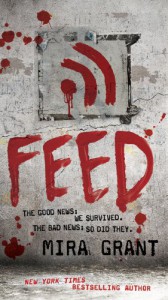
I put this book down about ten minutes ago, thought, "dear god, that was depressing", ruminated for a bit, and then reached for my laptop. Please excuse me, as I'd love to write an excited review about intrepid bloggers, zombie-ravaging, and conspiracies, but the ending rather threw me for a loop.
I did enjoy Feed, as I usually enjoy political intrigue with intermittent zombies; it's a niche, though one that includes utterly banal villains as part of the deal. (This complaint only applies to the human antagonists; the zombies preformed quite satisfactorily.)
Otherwise, Grant has very much done her homework and the world she has built is bleak, cowardly, and well-researched, from the van to the geography to the tech. And in the end, it is a novel about a pair of siblings, their quest for truth, and their war on fear.
'The zombies are here, and they’re not going away, but they’re not the story.'
-Georgia Mason
 1
1
House of Leaves
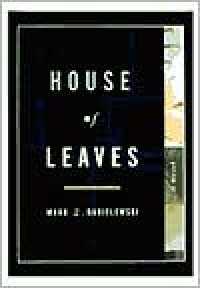
Nested within House of Leaves are these stories:
- Johnny Truant
- The old man, Zampanò
- The Navidsons and the house
Johnny Truant has some issues leading back to his childhood to which editing the deceased Zampanò's unfinished magnum opus triggers a delayed reaction.The fact that most of what is in the old man's book is fictional does not detract Truant from what he believes to be his mission to edit it.
In the book, which is also titled House of Leaves, Zampanò analyses a documentary-style horror film called "The Navidson Record", the story of a young family who buy a house, looking for a fresh start in a rural town in Virginia. The house isn't the Navidsons', though they do live there for most of the events of the film. The house (or, in all likely-hood, a crude facsimile of a house) doesn't belong to anyone and it intends to keep it that way.
Perhaps House of Leaves (the one written by Danielewski) is about a poison that seeps through film and written word as the house protects itself, though it is just as likely the sad story of a man succumbing to his genetics. Perhaps it needs to be both.
If you can wade through the more pointless of Zampanò's footnotes, you'll find a thriller lurking among the pages.
'There's only one choice now: finish what Zampanò himself failed to finish. Re-inter this thing in a binding tomb. Make it only a book.'
-Johnny Truant
Bitter Seeds

If you've ever had the "who would win in a fight?" argument*— and enjoyed it— you might also enjoy this novel. It begins with an interesting alternate history concept: would the outcome of WWII have been the same if the Nazis had actually succeeded in creating their master race? What if the British had used warlocks to combat this new threat?
Sure, the plot may not progress very quickly in some places, and you might end up hating all the characters just a little, but facts and fantasy blended seamlessly enough for me to see the charm in both the detail and pragmatism with which Tregillis has infused his book. There are also Lovecraftian monster/demon creatures that exist in the spaces between time and want all of humanity dead, which is clearly awesome in both senses of the word.
*I'm a Batman girl, but it's always Superman, hands down. (Or Doc Manhattan, if we're traversing DC universes.)
Guards! Guards! (Discworld Series)
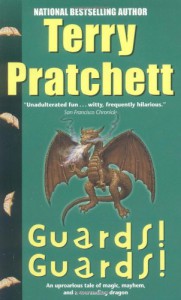
Introducing some interesting and significant characters if you read this series in the appropriate order! (Oops.)
The direction of this sub-series has been set with the leisurely romantic life of Cpt. Vimes, the Patrician's interest in Carrot, and the beginning of the Night Watch's upwardly mobile journey in the esteem of the citizens of Ankh-Morpork. The Librarian gets deputized and there are a few inadvisable arrests made. The story is intermittent with snarky commentary about the human condition —I'm not super with-it concerning philosophy (and really, who would want to be?), but think: T-Hobbes— and tied up with a pretty red bow that possibly symbolizes quite a lot of fire.
'If there was anything that depressed him more than his own cynicism, it was that quite often it still wasn't as cynical as real life.'
-Sam Vimes
Deathless

A sideways homage to the story of Marya Morevna and the war between life and death. I would say this book is even more bewildering than the original Russian folklore, a fact which is definitely conducive to reading it.
'“Oh, Marya Morevna! Do you know how the church-folk call me, me and my daughter Gamayun, when they paint us on their ceilings? They call us archangels, and say that we live in heaven, where no vine of sorrow or memory grows. That is where I sent you, not to heaven—tscha! I know nothing of that place. But to a place like the ceiling of a church.”'
-Alkonost, Tsar of Birds
The Way of Shadows (Night Angel Trilogy #1)

I usually have trouble with books in which outright stated facts are proven to be lies, but I found that I didn't mind the trickery in this novel of assassins, sorcerers, and conspiracy.
(Heads-up that this novel does not pass the Bechdel test, if that's an issue for you.)
'“Do you know what punishments I've endured for my crimes, my sins? None. I am proof of the absurdity of men's most treasured abstractions. A just universe wouldn't tolerate my existence.”'
-Durzo Blint
Sheepfarmer's Daughter
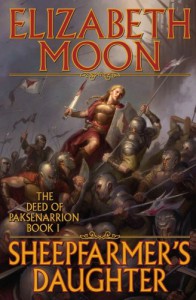
The main character in this novel, Paks, escapes an unwanted marriage agreement and joins a mercenary army. She kicks ass, but only after the appropriate amount of training.
The moral dilemma of Paks being in a mercenary army is postponed by the arrival of the evil Honeycat, who tortures and pillages and obviously must die. The fact that Paks kills people for money can be overlooked when you see that she kills the evil people. Process of elimination, right? ... Right?
I ultimately enjoyed this fantasy novel of magic, mass murder, and mercenary mayhem.
Please note that Elizabeth Moon is not afraid to kill characters.






